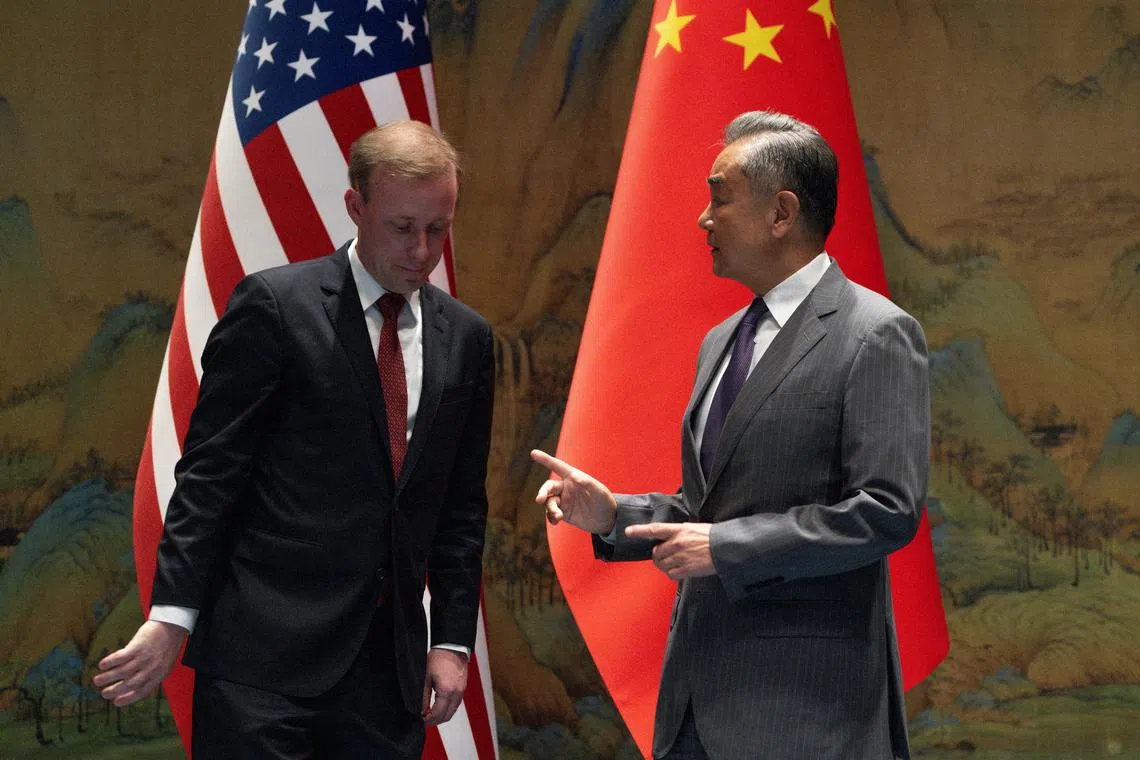Jake Sullivan meets Xi as wide-ranging China-US talks near end in Beijing
Sign up now: Get ST's newsletters delivered to your inbox

Mr Xi Jinping told Mr Sullivan that Beijing was committed to a stable relationship with Washington.
PHOTO: REUTERS
BEIJING - US National Security Adviser Jake Sullivan met Chinese President Xi Jinping in Beijing on Aug 29, wrapping up three days of wide-ranging talks aimed at easing tensions between the two world powers ahead of November’s US election.
As the pair sat down in the Great Hall of the People, Mr Xi told Mr Sullivan that Beijing was committed to a stable relationship with Washington.
“In this changing and turbulent world, countries need solidarity and coordination... not exclusion or regress,” Mr Xi said.
Mr Sullivan told Mr Xi that US President Joe Biden was committed to managing the relationship to avoid conflict and “looks forward to engaging with you in coming weeks”.
The White House said after the meeting that the two sides were planning for a call between Mr Xi and Mr Biden soon.
Over what he later said were 14 hours of discussions, Mr Sullivan covered a range of issues complicating ties
But considerable gaps remained on some issues, with Mr Sullivan saying they reached no new agreements on the South China Sea and had “vigorous give and take” on economic security and trade issues.
“We didn’t discuss the American election,” he added.
More progress was made in military ties, however. Mr Sullivan met Mr Xi’s leading military adviser, and the two sides agreed that US Indo-Pacific command leaders would soon speak by phone to their counterparts in China’s southern theatre command, which covers its southern seas.
US military officials have long been eager for deeper working-level engagement amid regional disputes and increased deployments across East Asia.
One senior US official said differences with China over the shoals it contests with the Philippines, a US treaty ally, in the South China Sea were likely to be only managed rather than solved “for the foreseeable future”.
“If it’s not this shoal, it’s going to be another feature,” the official said.
Before meeting Mr Xi, Mr Sullivan had a rare discussion with a general considered by diplomats to be the President’s key military adviser – Mr Zhang Youxia, vice-chairman of the Central Military Commission. He also had extensive discussions with China’s top diplomat, Mr Wang Yi, on Aug 27 and 28.
With Mr Zhang, Mr Sullivan pushed for enhanced working-level communications between the countries’ militaries during what was the first meeting between Mr Zhang and a Biden administration official.
“Your request for having this meeting with me demonstrates the value the US government puts on military security and our military-to-military relationship,” Mr Zhang said as he greeted Mr Sullivan.
Mr Sullivan told Mr Zhang that both countries had a responsibility to prevent competition from veering into conflict or confrontation.
“Given the state of the world and the need for us to responsibly manage US-China relations, I think it’s a very important meeting,” he said.
The White House said Mr Sullivan raised concerns about China’s support for Russia’s defence industrial base, as well as Taiwan and the South China Sea.
Mr Zhang is believed to be close to Mr Xi and has survived turmoil in China’s military ranks. Western and Asian diplomats say he is more powerful than the defence minister, who more frequently meets foreign officials.
In the meeting on Aug 28, Mr Wang and Mr Sullivan discussed the prospect of fresh talks soon between Mr Biden and Mr Xi and shared contrasting perspectives on the conflicts in the Middle East and Ukraine, Chinese territorial claims from Taiwan to the South China Sea, and trade.
“The key to the smooth development of China-US interaction lies in treating each other as equals,” Mr Wang told Mr Sullivan, according to state broadcaster CCTV.
The White House said the two held “candid, substantive, and constructive discussions”.
In the final months of his presidency ahead of the Nov 5 election, Mr Biden has pushed direct diplomacy to influence Mr Xi and keep tensions at bay. US Vice-President Kamala Harris, the Democratic candidate, would probably pursue a similar strategy.
However, many analysts aligned with former president and current Republican candidate Donald Trump see that approach as too soft in the face of China’s increasingly assertive foreign policy. REUTERS


